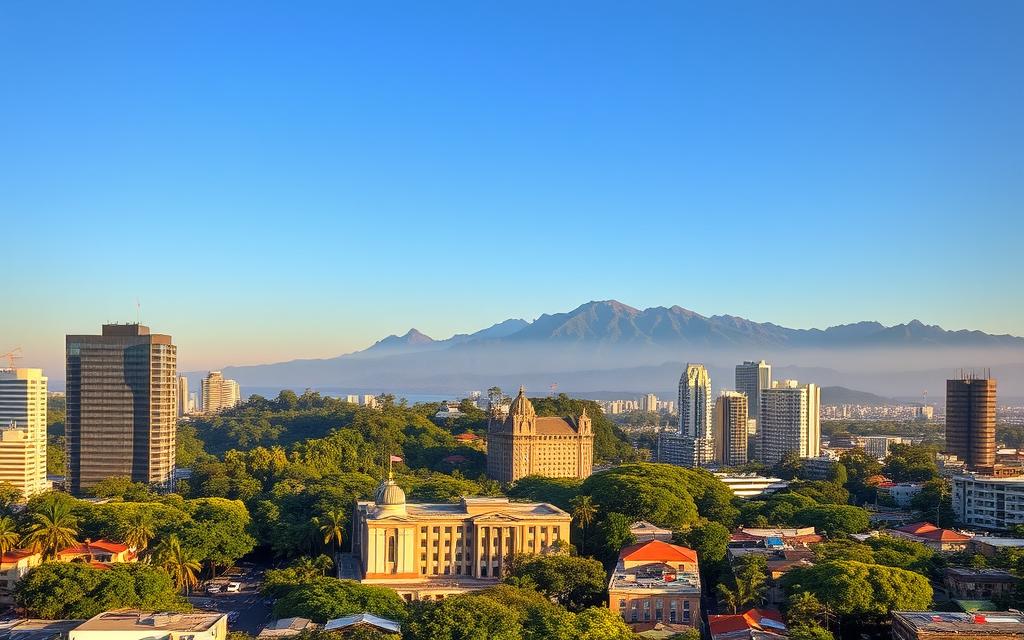Starting a Business in Costa Rica as a Foreigner | Your Guide

Did you know over 400 American companies thrive in Costa Rica? This small Central American nation is a hotspot for international entrepreneurs. Its stable economy, natural beauty, and welcoming environment make it an ideal place to explore new opportunities.
Costa Rica offers a straightforward registration process for foreigners. Whether you’re looking to invest in tourism, agriculture, or tech, the possibilities are vast. Residency options further enhance quality of life and open doors to local markets.
With a growing expat community and supportive policies, Costa Rica is more than just a tropical paradise. It’s a land of opportunity for those ready to take the leap. Our guide will walk you through every step to make your venture a success.
Overview of Residency and Business Opportunities in Costa Rica

Costa Rica’s welcoming culture and diverse opportunities make it a top choice for expats and entrepreneurs. The country offers a variety of residency options, making it easier for foreigners to settle and thrive. Whether you’re looking for temporary or permanent residency, there’s a path tailored to your needs.
Costa Rica’s Natural Appeal and Quality of Life
The country’s mild climate and stunning landscapes enhance its quality of life. From lush rainforests to pristine beaches, Costa Rica is a paradise for nature lovers. Families and professionals alike are drawn to its safe, friendly communities and affordable living costs.
With a growing expat population, the country fosters a supportive environment for newcomers. This makes it easier to adapt and build a fulfilling life. The low cost of living combined with high income potential creates a balanced lifestyle for residents.
Key Advantages for Immigrants and Entrepreneurs
Costa Rica offers several residency options, including rentista, investment, and permanent residencies. Each option has specific requirements, but all provide access to the country’s thriving market. For example, the rentista residency requires proof of stable income, while the investment residency encourages economic contributions.
Establishing a company here is straightforward, thanks to supportive government policies. The local market is diverse, with opportunities in tourism, agriculture, and tech. Entrepreneurs can also benefit from tax incentives and a skilled workforce.
For those seeking long-term stability, permanent residency offers a pathway to legal work and full integration into the community. Learn more about how to start a business in Costa Rica for residency to explore your options further.
Why Costa Rica is a Prime Destination for Entrepreneurs

Costa Rica’s blend of economic stability and strategic advantages makes it a magnet for global entrepreneurs. Its thriving economy and strategic location near the United States provide unparalleled access to North American markets. This combination creates a fertile ground for innovation and growth.
Stable Economy and Strategic Location
The country’s economy is diverse, with strong sectors like tourism, agriculture, and technology. Its strategic location facilitates exports, making it a gateway to Latin America and beyond. This geographic advantage attracts multinational companies seeking growth opportunities.
Attractive Business Climate and Incentives
Costa Rica’s government offers numerous incentives to entrepreneurs, including tax breaks and free trade agreements. These policies create a business-friendly environment that encourages investment. Experts credit these measures for the country’s rising success in global markets.
Supportive Expat Community and Government Initiatives
The local expat community is vibrant and collaborative, providing a robust network for newcomers. Government initiatives further support entrepreneurs, ensuring they have the resources needed to thrive. This combination of community and official support fosters a culture of success.
Starting a business in Costa Rica as a foreigner: A Step-by-Step Process

Embarking on a venture in Costa Rica requires a clear roadmap to navigate its opportunities. This step-by-step guide will help you understand the essential stages, from market research to legal preparation. By following this process, you can ensure a smooth transition into the country’s thriving economy.
Initial Market Research and Feasibility
Conducting thorough market research is the first step. Analyze local demand, competition, and consumer behavior to identify viable business opportunities. Costa Rica’s diverse economy offers potential in sectors like tourism, tech, and renewable energy.
A feasibility study is crucial to assess the viability of your venture. Evaluate costs, revenue projections, and potential challenges. This step ensures your business idea aligns with the local market and economic conditions.
Understanding Legal Documentation and Residency Options
Familiarize yourself with the legal requirements early in the process. This includes registering your company, obtaining necessary permits, and complying with local regulations. Costa Rica allows 100% foreign ownership, making it easier for international entrepreneurs.
Aligning your residency options with business documentation is essential. Explore pathways like rentista or investment residencies to streamline the process. Learn more about how to get residency in Costa to ensure a seamless transition.
By combining market insights with legal preparation, you can lay a strong foundation for your venture. This approach maximizes your chances of success in Costa Rica’s dynamic business environment.
Business Structures and Registration Process in Costa Rica

Understanding the right business structure is crucial for success in Costa Rica’s dynamic market. The country offers several options, each with unique benefits and implications. Choosing the correct legal entity ensures compliance and protects your interests.
Choosing the Right Business Structure
In Costa Rica, entrepreneurs can choose from structures like Sole Proprietorship, Sociedad Anónima (S.A.), and Sociedad de Responsabilidad Limitada (S.R.L.). Each option caters to different needs and scales of operation.
The S.A. structure is ideal for larger ventures, offering limited liability and the ability to issue shares. Smaller businesses often prefer the S.R.L. model, which also provides limited liability but with simpler management requirements.
It’s essential to evaluate your goals and consult legal experts to determine the best fit. The right structure can safeguard your assets and streamline operations.
Essential Steps for Company Registration
The registration process involves several key steps. First, secure a digital signature, which is mandatory for filing documents. Next, prepare and submit the Articles of Incorporation to the National Registry.
After registration, obtain a corporate tax ID from the Costa Rican Tax Administration. Depending on your industry, additional permits or licenses may be required. For example, businesses in food service or construction often need specialized approvals.
Working with legal and accounting professionals can simplify the process. They ensure all documents are accurate and compliant with local regulations. This approach minimizes delays and sets a solid foundation for your venture.
By carefully selecting your business structure and following the registration steps, you can establish a strong presence in Costa Rica’s thriving economy.
Navigating Tax, Compliance, and Financial Obligations in Costa Rica

Understanding Costa Rica’s tax and compliance landscape is essential for smooth operations. The country’s regulatory framework is designed to support businesses while ensuring adherence to local laws. By staying informed, you can avoid penalties and build a strong financial foundation.
Overview of Tax Regulations and Corporate Fees
Costa Rica’s tax system includes value-added tax (VAT) at 13% and corporate income tax at 30%. Small and medium-sized enterprises (SMEs) benefit from progressive tax rates, with exemptions for new businesses. Additionally, businesses must pay annual corporate fees based on government-determined rates.
Employee-related taxes, such as social security contributions, are mandatory. Employers must contribute approximately 24% of an employee’s salary to the social security system. These obligations ensure workers receive benefits like healthcare and pensions.
Ensuring Ongoing Compliance with Local Laws
Compliance with local regulations is critical to avoid fines and legal issues. Businesses must register with the Costa Rican Tax Administration and obtain a taxpayer identification number. Accurate financial record-keeping is also required to meet reporting deadlines.
Labor laws mandate adherence to minimum wage standards, working hours, and employee benefits. Non-compliance can result in penalties, audits, or even business closure. To streamline these processes, many entrepreneurs seek professional support from legal and accounting experts.
For more details on tax residency, visit our guide on tax residency in Costa Rica. This resource provides valuable insights into managing your obligations effectively.
Marketing and Growth Strategies for Your Costa Rican Venture
Effective marketing strategies are essential for thriving in Costa Rica’s competitive market. Combining digital and traditional techniques can help you reach a diverse audience. Tailoring your approach to the local context ensures better engagement and results.
Integrating Digital and Traditional Marketing Techniques
Digital marketing, including SEO and social media, is crucial for reaching tech-savvy consumers. Platforms like Facebook and Instagram are widely used in Costa Rica, making them ideal for targeted campaigns. Traditional methods, such as radio and print ads, still hold value, especially in rural areas.
Timely execution of campaigns can give you a competitive edge. Aligning your efforts with local events or holidays can boost visibility. A well-structured plan ensures your message resonates with the right audience at the right time.
Building and Leveraging Local Networks
Strong local networks are invaluable for growth. Partnering with community organizations or influencers can enhance your brand’s credibility. These connections also provide insights into consumer preferences and trends.
Service offerings tailored to the Costa Rican market can set you apart. For example, eco-friendly products align with the country’s sustainability values. Understanding the local culture and needs ensures your offerings are relevant and appealing.
Successful businesses often combine digital outreach with community engagement. This dual approach maximizes reach and builds lasting relationships. For more insights, explore our guide on Costa Rican dual citizenship to understand how local ties can benefit your venture.
Leveraging International Banking & Investment Opportunities
Costa Rica’s robust financial infrastructure supports seamless international transactions. Entrepreneurs and investors can access advanced tools to manage cross-border operations efficiently. From digital banking platforms to government incentives, the country offers a wealth of opportunities for growth.
Utilizing Smart Banking Solutions for International Transactions
Digital banking platforms like Wise Business simplify global transactions and currency exchanges. These tools reduce costs and streamline operations, making it easier to manage international funds. For example, Wise Business accounts allow users to hold multiple currencies and transfer money at competitive rates.
Local banks also offer tailored services for international clients. Opening a business account in Costa Rica is straightforward, with options for both local and foreign currencies. This flexibility ensures smooth financial operations, whether you’re paying suppliers or receiving payments from overseas.
Attracting and Managing Foreign Investment
Costa Rica’s government actively encourages foreign investment through incentives like free trade zones. These zones offer significant tax and fee reductions, making them attractive for businesses. Companies operating in these areas benefit from exemptions on import duties and corporate taxes.
To attract investors, it’s essential to highlight the country’s economic stability and growth potential. Sectors like technology, tourism, and renewable energy are particularly promising. By leveraging these opportunities, businesses can secure funding and expand their operations.
Managing cross-border investments requires careful planning. Tools like financial management software help track returns and key metrics. This ensures transparency and accountability, which are crucial for maintaining investor confidence.
For more insights on banking solutions, explore our guide on the best banks for digital nomads in Costa. This resource provides valuable information for optimizing your financial operations.
Conclusion
With its thriving economy and supportive environment, Costa Rica offers a unique blend of opportunities for global entrepreneurs. From its quality of life to attractive economic incentives, the country provides a solid foundation for success. The process, from market research to registration and compliance, is straightforward with the right guidance.
Leveraging local networks and international tools can further enhance your venture. Whether you’re exploring residency options or tapping into the vibrant expat community, the resources available make it easier to adapt and grow.
Take the first step today by connecting with experts or using the resources provided. Your entrepreneurial journey in this dynamic country awaits.


